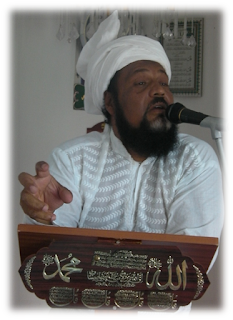Each one of you must exhort to
mutual love, generosity, the practice of Islam and the knowledge of oneself.
The Paradoxes in the 'Muslim'Condition
The one for whom the word Allah was a viaticum
(that is, the Muslim) is now under the control of attachment to material goods
and the fear of death. Drunkenness (in favour of Spirituality/ to lose oneself
in Spirituality), fervour and joy have deserted him: His religion is found in
the book, and he is himself in the grave. The soul has left the body of fasting and
prayer and other pillars of Islam; And as the soul has left prayer and fasting,
the individual is without harmony and people without discipline, hearts being
empty of the warmth of the Quran. How can we hope for an improvement from such
men?
O Allah! The Muslim has abandoned the self, hold out Your hand to him, for
the water covers him higher than the head. The prostration (in Salaat) that makes
the earth tremble has the power to make the sun and the moon turn according to its
desire. If it were to seek the meaning of this prostration, the stone would
vanish in the air like smoke! But now the Muslim no longer knows humility,
there is nothing else in him but the weakness of old age. Who still realizes
the majesty of the words spoken during the prostration: "My Lord (Allah) is Most High" (Allahu
Akbar)? Is all this due to our fault, or is it believed that there is some
weakness (may Allah preserve us from this thought) in these words?
Everyone
moves quickly on his own path. Only our mount is without bridle and roams endlessly
without a goal. Possessing the Quran and having no ardour for research is a
very strange thing. If the Lord has endowed you with vision, look at the coming
times: rash reasons and hearts without ardour, eyes without shame and drowned
in illusion, science and art, religion and politics, intelligence and sensibility,
everything revolves around material things. Young people have thirsty lips, but their cup
is empty; The faces are well washed, but the soul is black; The intelligence is
luminous but has only a weak vision, it is devoid of certainty and hope. The
young people's eyes have seen nothing in the world: They are poor beings,
denying themselves, believing others.
Acquire Knowledge of the Self
O my disciples, be always sincere in all your
actions; Free yourself from the fear of kings, so-called superpowers and
potentates. Do not renounce justice in anger or contentment; Keep moderation,
whether you are rich or poor. The precept is difficult, do not ingeniously try
to interpret it.
Do not look for a torch except in your own hearts. The support
of the souls is the Zikr and the Fikr, and as for the support of
the bodies, it is in the respect of oneself during youth. In this world as in
the other, power is acquired only by the maintenance of the soul and the body.
The purpose of the journey is the joy of contemplation (i.e. contemplation of
Allah as the Unique Creator). The secret of religion consists in saying
truthful words and abstaining from forbidden food. Solitude and companionship
is to contemplate the Divine Beauty. In the way of religion, be unbreakable
like the diamond. Bind your hearts to Allah, and live without vain scruples.




